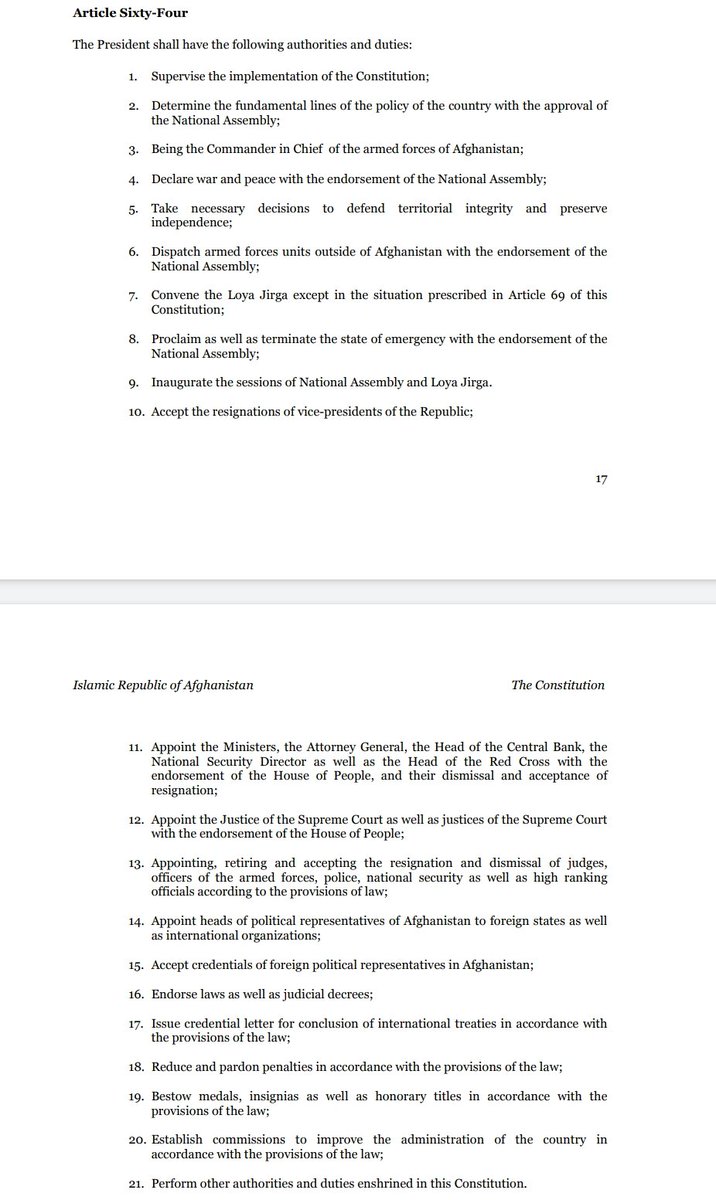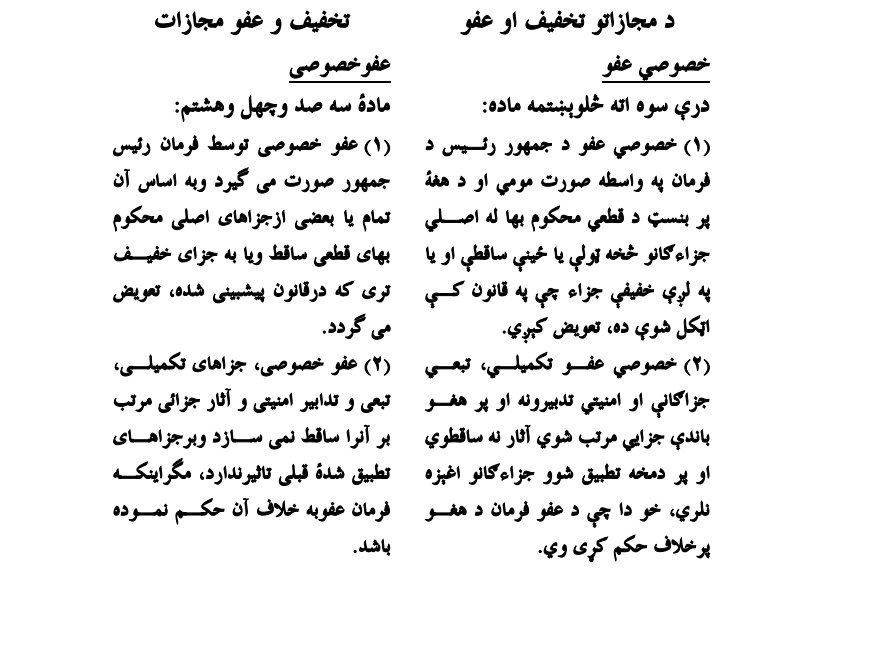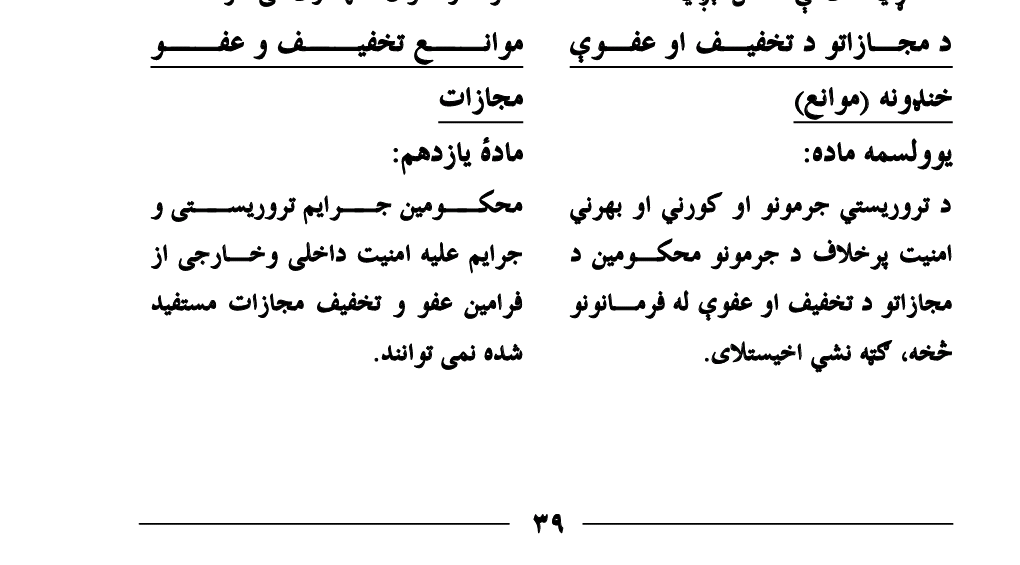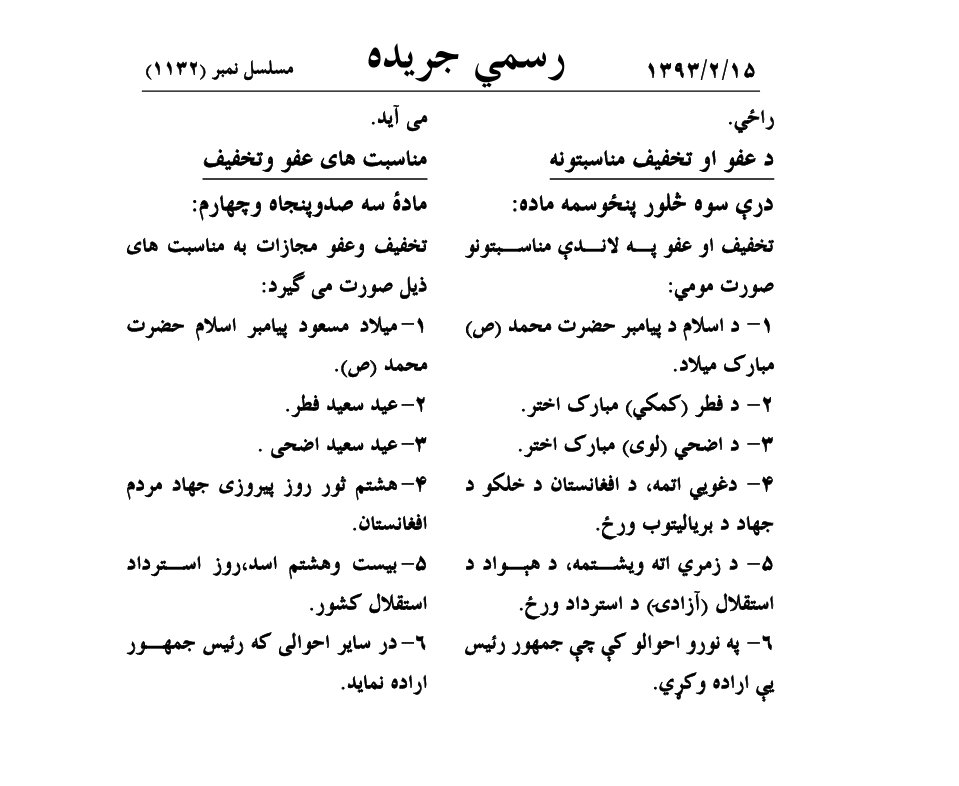Alright, so here comes a bit of a technical thread.
Under what pretext was Anas Haqqani - a convicted & incarcerated prisoner - freed?
A Presidential Pardon or something else? https://twitter.com/amnestysasia/status/1194560467290607617">https://twitter.com/amnestysa...
Under what pretext was Anas Haqqani - a convicted & incarcerated prisoner - freed?
A Presidential Pardon or something else? https://twitter.com/amnestysasia/status/1194560467290607617">https://twitter.com/amnestysa...
Before going further, I would like to point out that the tweet above by @amnesty is misleading.
While customary international law prohibits & #39;amnesties& #39; for international crimes, it is silent on & #39;pardons& #39;.
For a primer on the difference see https://abs.twimg.com/emoji/v2/... draggable="false" alt="👇" title="Down pointing backhand index" aria-label="Emoji: Down pointing backhand index"> https://www.icrc.org/en/document/icrc-explainer-what-does-international-law-say-about-pardons-war-crimes">https://www.icrc.org/en/docume...
https://abs.twimg.com/emoji/v2/... draggable="false" alt="👇" title="Down pointing backhand index" aria-label="Emoji: Down pointing backhand index"> https://www.icrc.org/en/document/icrc-explainer-what-does-international-law-say-about-pardons-war-crimes">https://www.icrc.org/en/docume...
While customary international law prohibits & #39;amnesties& #39; for international crimes, it is silent on & #39;pardons& #39;.
For a primer on the difference see
Because Anas was already convicted, he could not be considered under the amnesty prohibition.
Thr other possibility is that of pardon.
Important to note that under Afghanistan& #39;s Constitution (art. 64), the President can grant pardons.
Thr other possibility is that of pardon.
Important to note that under Afghanistan& #39;s Constitution (art. 64), the President can grant pardons.
Some analysts have argued that the President is barred from exercising this pardon in cases of suspected/convicted terrorists. https://twitter.com/EhsanQaane/status/1194572399913644032?s=19">https://twitter.com/EhsanQaan...
The most robust evidence I have found for this argument are contained in articles 348-354 of the Afghanistan Criminal Procedures Act (ACPA).
Art. 348 gives President broad discretionary power of pardoning criminals.
Art. 348 gives President broad discretionary power of pardoning criminals.
Art. 349 however specifies certain crimes for which a pardon might not be granted.
As per article 11 of Gazette 1190 (2016), terrorism has also been included in list of crimes not pardonable.
N.B. thanks @EhsanQaane for pointing this out.
As per article 11 of Gazette 1190 (2016), terrorism has also been included in list of crimes not pardonable.
N.B. thanks @EhsanQaane for pointing this out.
However, worth pointing out that despite the above decree, Pres @ashrafghani has pardoned thousands of suspected & convicted terrorists.
For example, by 2018 the govt had released some 415 Hizbi Islami prisoners (majority under terrorism convictions) https://da.azadiradio.com/a/29290406.html ">https://da.azadiradio.com/a/2929040...
For example, by 2018 the govt had released some 415 Hizbi Islami prisoners (majority under terrorism convictions) https://da.azadiradio.com/a/29290406.html ">https://da.azadiradio.com/a/2929040...
And promised to release another 2500-3000 Hizb prisoners.
Digressing slightly, that Agreement with Hizb also granted broad amnesty to Hizb leaders including Hetmatyar.
Digressing slightly, that Agreement with Hizb also granted broad amnesty to Hizb leaders including Hetmatyar.
According to #ICC, both pardons & amnesties are illegal whereas most experts argue that pardons can be legal depending on a number of factors including interest of justice, reconciliation efforts etc https://twitter.com/Afghan_Policy/status/1128600268168294400?s=19">https://twitter.com/Afghan_Po...
Returning back to pardons, the President hasn& #39;t only released Hizb fighters, hundreds of Taliban prisoners have similarly been released. https://www.nst.com.my/world/2019/06/493976/afghan-president-pledges-release-nearly-900-prisoners">https://www.nst.com.my/world/201...
It appears the President has been relying on art. 354 which stipulates a number occassions when the President can exercise these powers.
Sub para 6 provides a vague clause of "in other circumstances if the President intends so"
Sub para 6 provides a vague clause of "in other circumstances if the President intends so"
The government has relied on this ambiguous clause to effectively roll back the prohibition on pardoning certain criminals including terrorists.
For an excellent legal analysis, see https://abs.twimg.com/emoji/v2/... draggable="false" alt="👇" title="Down pointing backhand index" aria-label="Emoji: Down pointing backhand index">
https://abs.twimg.com/emoji/v2/... draggable="false" alt="👇" title="Down pointing backhand index" aria-label="Emoji: Down pointing backhand index">
https://heinonline.org/HOL/LandingPage?handle=hein.journals/calwi49&div=14&id=&page=">https://heinonline.org/HOL/Landi... #heinonline
For an excellent legal analysis, see
https://heinonline.org/HOL/LandingPage?handle=hein.journals/calwi49&div=14&id=&page=">https://heinonline.org/HOL/Landi... #heinonline
While I have struggled to find material to clarify on what basis these prisoners are freed, it appears that a Presidential Pardon relying on art. 354(6) of ACPA might be the most plausible justification. http://www.bbc.com/persian/afghanistan-42634528">https://www.bbc.com/persian/a...
If so, this seems to be a perverse subservience of the rule limiting the use of Presidential pardons.
Moreoever, a common reading of said article does not suggest the ability of Executive to override the restrictions stipulated in art 349 ACPA.
Moreoever, a common reading of said article does not suggest the ability of Executive to override the restrictions stipulated in art 349 ACPA.
Before ending the thread, I would like to point out that instead of a pardon, one can argue a commuting of the sentence. This is a laughable proposal but please bear with me.
This would only apply to the T3 rather than the other cases mentioned.
This would only apply to the T3 rather than the other cases mentioned.
While ordinarily, house arrest in lieu of prison is envisaged in art. 151 of Criminal Code 2017, it specifically excludes sentences beyond 5 years (1) & terrorism convicts (sub-clause 3).
Also, under ACPA (153), the President can only communte 3/4th of a person& #39;s sentence.
Hence none of these apply to Anas.
Yet one can argue, strenuously, that President commuted the prison sentence for house arrest in Qatar, given the extraordinary circumstances. https://abs.twimg.com/emoji/v2/... draggable="false" alt="😶" title="Face without mouth" aria-label="Emoji: Face without mouth">
https://abs.twimg.com/emoji/v2/... draggable="false" alt="😶" title="Face without mouth" aria-label="Emoji: Face without mouth">
Hence none of these apply to Anas.
Yet one can argue, strenuously, that President commuted the prison sentence for house arrest in Qatar, given the extraordinary circumstances.

 Read on Twitter
Read on Twitter





